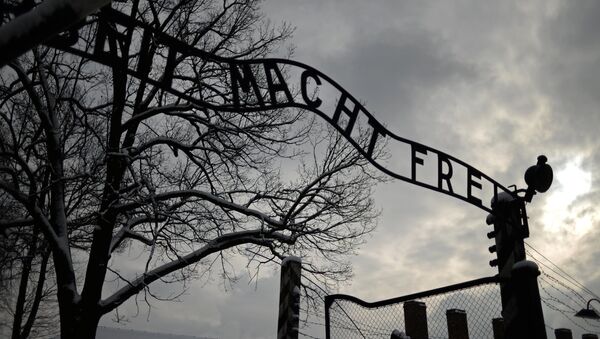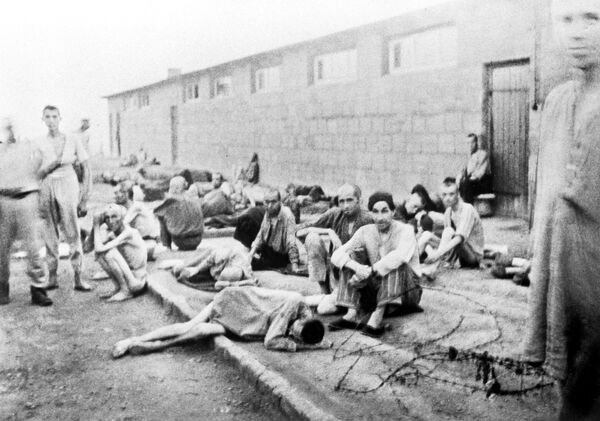January 27 marks Holocaust Memorial Day, when the international community commemorates the six million Jews and millions of other minorities that were murdered during the genocide of World War II.
Survivors of the atrocities recalled the events of that time and shared their heart-breaking stories.
A Whole Family Murdered by the Nazis
Paul Sobol, a Belgian Jew, was a teen when, in September 1942, he was arrested together with his whole family in Brussels. His parents did not hide from anyone, lived in their own home, and so the Germans, who had lists of all the Jews in the city, easily found them.
"In April of 1945, there was an evacuation, the camp was to be closed; we knew we had to run before they killed us. But we were too late. We were transported from Auschwitz to Dachau, near Munich. On May 1, I was liberated by the Americans. I was 19 years old," Paul Sobol recalled.
Taking a Shower Every 10 Months
Herman Neuman was arrested along with his family after they were reported to the Nazis.
"Some informed on Jews and got money for it. The Germans had lists of all the Jews who lived in Belgium. Sometimes children sacrificed themselves for the sake of their parents: they gave up so that the adults wouldn't be arrested," the man recalled.
Neuman had two brothers who were married and had small children.
READ MORE: German Courts Reportedly Reject Plea of 96-Year-Old 'Bookkeeper of Auschwitz'
"My brothers and I managed to escape, but their wives and my nephews did not," Herman said.
The man spent almost three years in the camps.
"We worked from 6 am to 6 pm. We were not allowed to eat at work, and the rest of the time we got only scarce food. We were shaved, I remember, it was terribly cold. […] Until April, ‘44 I was wearing the same clothes in which I was arrested. We were allowed to take a shower very rarely. For the duration of the time, I washed myself only three times. All the mud was difficult to wash off," the man recalled.
Survive Whatever the Cost
Professor Tomas Radil from the Czech Republic was born in 1930, in a region that is now a part of Hungary.
"My family and I were brought to Auschwitz-Birkenau in a freight car, and all of us together had to go to the sorting station. My parents were perfectly healthy, they were 63 and 56. They wanted to stay together, and their wish was fulfilled: they were sent together to a crematorium. I was asked about my profession and age, and I answered: "Locksmith, 16 years old." This was not true, because I was still at school, and I wasn't even 14. But I realized that I had to adapt, otherwise they'd kill me. It was absolutely clear from the very beginning," Tomas Radil said.
"We were so happy that the Red Army soldiers helped us. But the feeling of happiness lasted for hours, maybe days, but not more. We had a clear goal before — to survive, and after the war there were no clear goals anymore, we did not know what happened to our families, what awaited us at home… Soon I started coughing up blood," the man said.
He recalled how the Soviet soldiers helped him and sent him to doctors, because at that time it was clear that he was sick with tuberculosis. He was given a special document to replace his passport, and after two months he could go home.
"I came home first, there were no happy people; some people returned, most did not. After all this, I did not see smiling faces for a long time," the former Auschwitz prisoner concluded.
Lessons Learned
Commenting on the atrocities of the Holocaust, a professor at Uniwersytet Jagielloński, Anna Razny, said that it's important to remember, that the Nazi ideology not only contradicts Christian morality, it also aims at the extermination of other nations.
"It was an ideology of war; an ideology that advocated destruction for the sake of the domination of one people — the Germans. The anniversary of the liberation of Auschwitz should be a warning for all those who want to stick to some new ideology of global domination, an ideology of extermination or enslavement of others," Razny said in an interview with Sputnik.
She added that it's important to constantly remind people just how important the idea of peace is.
READ MORE: Nazi Hunters Demand Finland's Answer on Volunteers' War Crimes in Waffen SS
"The liberation of Auschwitz is a symbol of the victory of peace over war," she said.
Commenting on the current controversy regarding the role of the Red Army in the liberation of Poland from the fascists, the professor said:
"The camp was liberated by the Red Army. Not allied forces, not Americans, who, of course, played an important role in the victory over Hitler's Germany, but the Red Army, the Soviet Union," Razny said.
"The Red Army entered occupied Poland in order to fight against Hitler, because this was the political and moral priority of its actions at the time. The Yalta agreements, a new division of Europe and of the world were a result of the victory over Hitler. And one shouldn't deny the chronology and talk about an automatic new occupation of Poland. This contradicts history and the fact that the American troops, having entered Europe to fight against Hitler, remained there after victory. Well, the American troops still remain there, despite the fact that Soviet troops left the zone under their control many years ago," the expert concluded.
In the drive to liberate Poland from the Nazis, over 600,000 Red Army soldiers laid down their lives, more than in any other country outside the Soviet Union. However, many Poles consider the subsequent presence of Soviet troops to have been an occupation, and are willing to eliminate all reference to the ideology of the Red Army on their territory.






